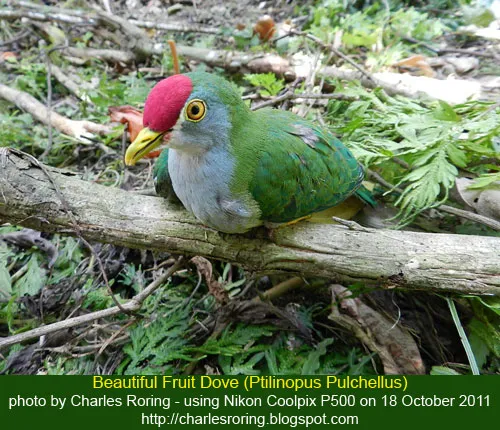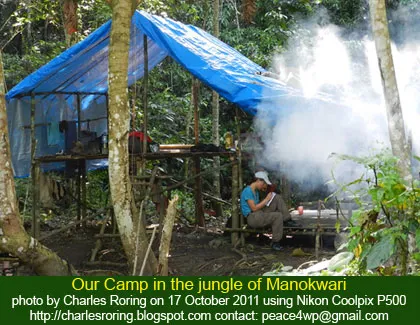The lowland rainforest in Inggramui is a must see destination for anybody who is interested in bird watching. It is a three hour walk from Inggramui village in the sub-urban area of Manokwari city. When I guided Thomas and her daughter Sandra (two tourists from the Netherlands) to this forest area from 16 to 19 October 2011, we had a chance of seeing a dove from very close distance. I even held it in my hands. A trap made by Papuan hunters near a fruit tree had caught it. When the hunters told us that they had just got this dove, we had just returned to Camp 1 after walking for a few hours from Camp 2 that was located deep in the jungle of the north coast region of Manokwari.
 |
| Beautiful Fruit Dove |
I immediately called Sandra if she was interested in taking some pictures of this beautiful bird. She came with her Nikon D4 - a small D-SLR camera that was light - suitable for travelers who like walking in the jungle and do not want to carry heavy photographic devices. I shot the bird using my Nikon Coolpix P500.
During our tours in the rainforest of Arfak mountains and the North Coast of Manokwari, I brought with me a copy of Birds of New Guinea - a very good book written by Beehler and Zimmerman. We opened the book and got some information about this fruit dove. Its name was Beautiful Fruit Dove. In Latin, it was called Ptilinopus pulchellus. The bird had pink cap on her head. Sandra released the bird at a river near our Camp. Fruit doves, birds of paradise, cockatoos, hornbills and various other birds in this mountain range help trees by dispersing their seeds thus expanding their growth coverage area in the rainforest.
The eco-tour to rainforest of Inggramui village in Manokwari that I am now promoting will help provide alternative jobs to hunters that are more friendly to the environment. If more tourists visit this rainforest, we can effectively preserve this precious environment and raise the awareness of the Papuan people that they can still survive in this modern world without having to irresponsibly exploit the wood from their rainforest or catch wild animals for trading. |
| Basecamp in the forest of West Papua |
In addition to the rainforest of Inggramui, other wildlife watching destinations that I recommend to tourists are District Senopi, lowland rainforest of Arfak mountains and Numfor island.
Optical Devices that you need for bird watching
If you want to travel to Manokwari for watching birds, don't forget to bring binoculars, telephoto camera or if possible a powerful digiscoping device. Also prepare some plastic sheets or bags to cover your equipment during rainy days.
Why rainforest in Inggramui is highly recommended for birding
I can say that when you travel to the rainforest of Inggramui, you will see a lot of birds that are endemic to New Guinea island - the largest tropical island in the world. I have been trying to convert local hunters to become wildlife guide. Since they are expert in catching animals, they can still set up traps to catch the animals but after shooting them with digital cameras and making scientific identification of the wild animals, tourists can have them released to their natural habitat again. We all know that tropical rainforest is a very important ecosystem that effectively absorbs CO2 gases that we emit every day. Thus the preservation of the rainforest through eco-tour program that I am now promoting in Manokwari regency of West Papua will give positive contribution in fighting global warming. Because this eco-tourism program heavily depends on the visitation of tourists, anyone who is willing to visit our rainforest and gives some financial contribution to the creation of jobs for these hunters will always be welcomed. For further information about traveling in Manokwari, please contact me via my email: peace4wp@gmail.com. by Charles Roring
Post Update 25 Nov 2019
I don't offer camping and birding tours to this forest anymore.
Also read:
Beautiful Fruit Dove in Raja Ampat
Converting hunters to birding and wildlife guides
Rainforest flowers in Inggramui village of Manokwari
Rainforest insects in Inggramui village of Manokwari
No comments:
Post a Comment